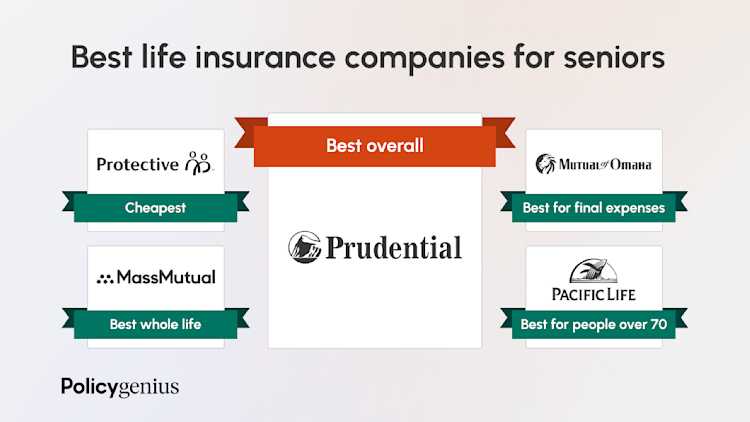Although baby boomers had the highest percentage of generational life insurance ownership in 2023, 27% still reported that they needed more life insurance, whether they need to buy a policy for the first time or buy more life insurance than they already have. [1]
Whether you’re replacing a policy or looking at quotes for the first time, we researched the best life insurance companies for seniors using industry data, pricing from Policygenius carrier partners, and ratings from third parties like AM Best and J.D. Power.
The 5 best life insurance companies for seniors in 2024
Insurer | Policygenius rating | Best for | AM Best rating | Max. issue age | |
4.9/5 ★ | Whole life | A++ | 70 | ||
4.8/5 ★ | Affordability | A+ | 80 | ||
4.8/5 ★ | People over 60, people over 70 | A+ | 80 | ||
4.5/5 ★ | Final expense, people over 80 | A+ | 85 | ||
4.1/5 ★ | Seniors, term life | A+ | 75 |
Best overall life insurance for seniors: Prudential
Prudential can offer affordable life insurance for seniors, including people in their 60s and 70s. Older people with osteoporosis or other aging-related health issues can get cheaper term life insurance rates with Prudential than with other insurers. Prudential also has more flexible income requirements than other insurance companies, making it easier for retirees to get the amount of coverage they need.
Read more about how your health affects your life insurance rates
Best term life insurance for seniors: Prudential
Prudential is also our top term life insurance company for seniors thanks to its favorable guidelines toward pre-existing conditions associated with aging, flexible income requirements, and living benefits rider.
Term life insurance is one of the most popular types of life insurance because it’s affordable and doesn’t come with any complex tax restrictions or regulations. Term life insurance rates increase by an average of 4.5% to 9% each year as you get older. This means term life will be pricier for seniors, but still cheaper than other life insurance options.
Best whole life insurance for seniors: MassMutual
For seniors who want more than $50,000 of whole life coverage, MassMutual is a reputable company that pays higher dividends to its policyholders than most of its competitors.
Whole life insurance is a type of permanent life insurance policy that doesn’t expire. It includes a cash value component separate from the death benefit that grows tax-deferred. Because of that, it’s much more expensive than traditional term life policies.
Permanent life insurance can be beneficial for people who want to use life insurance as an investment tool, or people who have long-term financial obligations, like dependents who need lifelong support.
Cheapest life insurance for seniors: Protective
Protective’s pricing makes it a top contender for relatively cheap life insurance for seniors. It can offer more affordable term life rates compared to some of its competitors.
Protective also has flexible financial guidelines regarding unearned income such as pensions, Social Security, and investment income. However, the company does require a minimum household income of $25,000.
Best life insurance for final expenses: Mutual of Omaha
Mutual of Omaha offers a wide array of final expense policies to account for older adults with varying coverage needs and health concerns. This is also an easy way for people over age 60 to get life insurance with no medical exam.
Final expense insurance, also called burial insurance, is a type of permanent coverage that doesn’t expire and is designed to cover end-of-life expenses, like a funeral. Maximum coverage amounts are typically between $20,000 and $40,000.
Final expense policies are a type of simplified issue life insurance. Simplified issue life insurance has a simpler application process and requires fewer health qualifications for approval.
Mutual of Omaha also offers guaranteed issue life insurance, which is another final expense option. It’s costlier than a simplified issue policy, but offers near-certain approval.
Best life insurance for people over 80: Mutual of Omaha
A final expense insurance policy from Mutual of Omaha is the best choice for seniors age 80 to 85 (age 85 is when most insurers stop offering coverage), as well as the best no-medical-exam life insurance option for this age group.
Compared to other insurance companies, Mutual of Omaha’s coverage amounts are more flexible and policies are available in more states. The insurer offers both simplified issue and guaranteed issue policy options.
Best life insurance for people over 60: Pacific Life
Pacific Life’s rates are more affordable compared to some of its competitors, even for people in their 60s. Pacific Life also offers life insurance to people with several types of health concerns, such as diabetes.
Best life insurance for people over 70: Pacific Life
Pacific Life is also a great option for people over 70. In addition to its flexibility with some health conditions, the company has a low coverage minimum of $50,000 for term policies, while other companies have a minimum of $100,000, offering older adults more flexibility for their coverage amounts.
What’s the best type of life insurance policy for seniors?
People in their 60s can usually get the most coverage for the best price by buying a term life policy. This is ideal if you’re preparing to retire or you still have outstanding liabilities, like a mortgage.
If you’re in your 70s, the best type of policy for you depends on your personal financial situation. You may need a term life policy if you still have debts or want to leave a legacy to your loved ones. If you’re simply looking for a way to fund end-of-life expenses, like a funeral or medical bills, a final expense policy may be a good fit for you. But if you have enough savings to cover your current and future financial needs, you might not need coverage at all.
And if you’re in your 80s, a final expense policy will likely be your best option.
Everyone’s coverage needs are different, so connecting with a licensed agent can help you find the right solution for your situation. At Policygenius, our agents are licensed in 50 states and can help you understand your policy options and determine which type of insurance is the best fit for you.

How much does life insurance for seniors cost?
A healthy 60-year-old can pay between $63 and $83 per month for a 10-year term life insurance policy with a $250,000 death benefit.
A healthy 70-year-old can pay between $173 and $245 per month for the same coverage, and a healthy 80-year-old could pay between $718 and $960 per month.
Men’s life insurance rates are higher than women’s because, historically, actuarial tables show that men usually die earlier than women. [2] In addition to gender and age, your premiums will depend on your health and the type of policy you decide to purchase.
Term life insurance rates for seniors
Age | Gender | $100,000 coverage amount | $250,000 coverage amount |
|---|---|---|---|
60 | Female | $34.13 | $62.60 |
Male | $42.45 | $82.70 | |
70 | Female | $85.89 | $173.39 |
Male | $112.00 | $245.01 |
Methodology: Average monthly rates are calculated for male and female non-smokers in a Preferred health classification obtaining $100,000 and $250,000, 10-year term life insurance policies. Life insurance averages are based on policies offered by Policygenius from Corebridge Financial, Foresters Financial, Legal & General America, Mutual of Omaha, Pacific Life, Protective, Prudential, Symetra, and Transamerica, and the Policygenius Life Insurance Price Index, which uses real-time data from leading life insurance companies to determine pricing trends. Rates may vary by insurer, term, coverage amount, health class, and state. Not all policies are available in all states. Rate illustration valid as of 10/01/2024.
Whole life insurance rates for seniors
Age | Gender | $50,000 coverage amount | $100,000 coverage amount |
|---|---|---|---|
60 | Female | $175 | $336 |
Male | $16 | $416 | |
70 | Female | $305 | $595 |
Male | $344 | $675 |
Methodology: Monthly rates are calculated for male and female non-smokers in a Preferred health classification obtaining $50,000 and $100,000 whole life insurance policies paid up at age 100. Whole life insurance rates are based on policies offered by Policygenius from MassMutual. Rates may vary by insurer, term, coverage amount, health class, and state. Not all policies available in all states. Rate illustration valid as of 10/01/2024.
Final expense insurance rates for seniors
Age | Gender | $10,000 coverage amount | $20,000 coverage amount | $40,000 coverage amount |
|---|---|---|---|---|
60 | Female | $32.71 | $62.53 | $121.86 |
Male | $43.76 | $84.32 | $165.43 | |
70 | Female | $53.24 | $103.28 | $203.35 |
Male | $74.61 | $146.01 | $288.82 | |
80 | Female | $98.43 | $193.66 | $384.12 |
Male | $139.73 | $276.26 | $549.31 |
Methodology: Average monthly rates are for male and female applicants obtaining $10,000, $20,000 and $40,000 simplified issue final expense policies. Life insurance rates are based on policies offered by Policygenius from Mutual of Omaha. Not all policies are available in all states. Rate illustration valid as of 10/01/2024.
What should seniors consider when shopping for life insurance?
Seniors should consider their finances and budget, their health, the insurance company, and their policy terms and conditions when shopping for a life insurance policy.
Financial responsibilities
Seniors should get enough life insurance to cover their remaining financial obligations — the amount will depend on their current needs, such as income for a surviving spouse, a funeral, or the remainder of a mortgage. When I worked directly with clients as an agent, I would often encourage them to think through questions such as:
How would your loved ones pay for your end-of-life expenses, including funeral or cremation costs? The median cost of a funeral in the U.S. is $7,848, according to the NFDA. [3]
Is there any outstanding debt that you need covered?
Are you more focused on estate planning and minimizing estate tax for your children?
Learn more about how much life insurance coverage you need
Finding the right company
Working with an independent broker is an easy way to compare policies from top insurers in one spot. They can help you compare policy choices and make sure you’re applying with a financially secure company.
An independent broker can also help you select the insurer that’s a good fit for your health profile, since each insurer factors in certain health conditions differently when assigning your rates.
Health considerations
Most insurers want to see that seniors have a primary care doctor, especially if they’re applying for a term life policy. If you’re above the age of 70 and don’t have a doctor you see regularly, you may find it more difficult to qualify for term life insurance.
Policy terms & conditions
You’ll want to know whether the policy you’re selecting has a level death benefit or a graded death benefit, especially if you’re applying for a final expense policy.
A level death benefit means that once you’ve purchased the policy, you’re covered under the full death benefit.
A graded death benefit means that for a period of time — often two years — your beneficiaries will receive only a portion of the death benefit if you die. After the waiting period, the full death benefit will become active.
If you have a high-risk health condition, your options may be limited to policies with graded death benefits. So for example, if you buy a $10,000 final expense policy, the full $10,000 payout may only become active one to two years later.
The insurance agent you’re working with will be able to outline the features of your policy before you buy.








